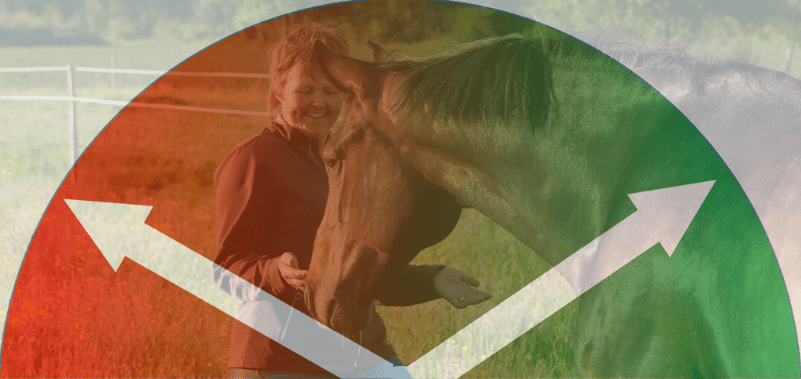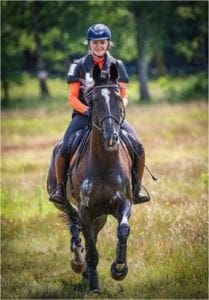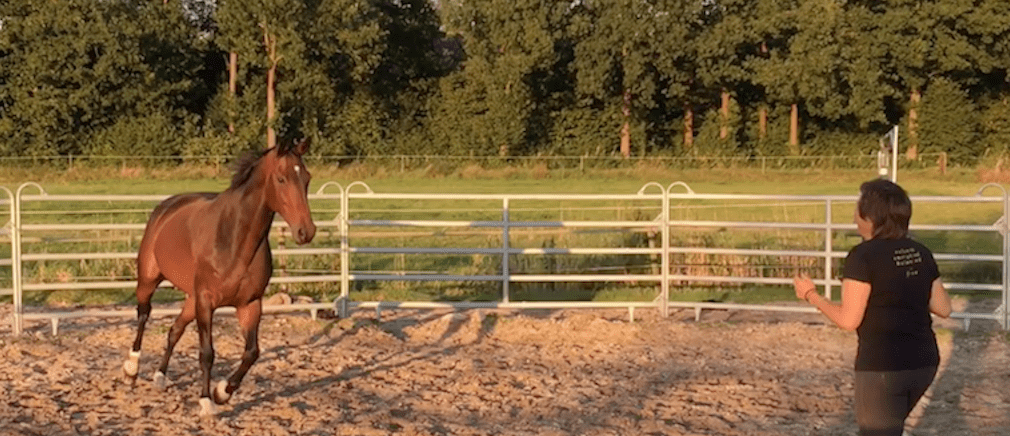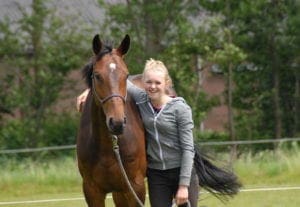Motivatie
About motivation: how much credit do you have on the Relationship Account with your horse?

Lees je dit liever in het Nederlands? Kijk dan HIER
There's nothing wrong about a bit of ambition ... as long as your horse WANTS to join your game
I would love to do all kinds of fun stuff with my horses. I would love to ride them. I would like them to develop healthy biomechanics. I would like to ride dressage, to jump, to play at liberty, to go on the trails and more. Above all I want to have a great time together with my horses.
How my horses feel about it matters!
How my horses feel about me also matters to me ... a lot! With everything we do I like to keep in mind that they did not ask for all of this. They have no idea whatsoever about my wishes and ambitions. They do not have a choice. They do not value prizes in competition, share my ambitions or understand the imaginary importance of 'keeping up appearances'. They owe me nothing!
How much credit does my horse give me?
Both me and my horses do not like to be forced into something. Still I am sometimes a bit intense or persistent when trying to teach them something new, to improve their physical fitness or to change their biomechanical patterns. It would make me sad though, if my horse would not want to be with me anymore after such an occasion. I always strive to have enough credit on our relationship account to allow some room for asking the extra effort, either mental or physical.
I never want to get below zero, in the red zone. So I need to make deposits into the relationship account on a regular basis. In other words: we do things that makes my horses feel good. So often and so much that he clearly stays interested in being with me and in the things we do together, even when I ask a bit more effort sometimes.
If it was about money ... how much can you afford?
Do you consider the state of your bank account before you buy something?
If you saved a bit you have something extra to spend. On the other hand: How does if feel if your account is negative and you have nothing left to spend? Does it cause stress or frustration? Does it keep you from your sleep when you are in debt?
I think we all agree that it's smart to economise before your account hits zero, and that it feels good to save something extra to play around with.
Your horse will tell you about the balance of your Relationship Account
Signs of plenty credit (green)
Your horse is curious and happy to apply effort. He shows a lot of try, is mentally engaged, offers initiative and sometimes offers even before you ask. He follows you freely and comes to meet you in the pasture.
Signs of increasing credit (light green)
Your horse is attentive, relaxed, responsive, greets you with a soft voice and does not walk away when you approach him in the pasture.
Signs of decreasing credit (light red)
Your horse shows lack of effort and interest, is slow in his responses or shows signs of tension or anxiety. He does not (try to) understand, is not relaxed or interested enough to think or reacts instinctive on your aids (with flight, fight, freeze of f***you). You have to work hard to get him to do what you want.
Signs of being indepted to your horse (red)
Repeated refusal, anger or fear. He gives up, is afraid to make mistakes or is in a state of learned helplessness. He turns away from you when you approach him and wants to avoid being saddled or groomed. Even when this behaviour is caused by somebody else, it can be you who has inherited the debts!
Making deposits into the Relationship Account on a regular basis
Everybody with horses will be confronted with all of the signals above in some way at some moment. Good and bad, small or substantial, occasional or structural. Sometimes it is a moment in time but if a certain behaviour shows up more often it becomes a tendency or even structural pattern. So we need to be aware in the Here&Now, because the balance of your Relationship Account is dynamic. It changes all the time when you are together with your horse. In the long run we want to develop lots of credit and stay in the green zone as far a possible. Every session with your horse should ideally add to the balance. On that day and for the longer term, increasing the bond with your horse over time.
What can you do?

-
- Know your horse! Know what makes him happy. Grazing, treats, voice rewards, scratches, resting, running, playing, touching, chewing on something, standing on something or simply doing nothing together. Not every horse likes the same things and it can change with the situation. Lots of horses do not really like to be petted on their face. Stressed horses usually do not value treats a lot and centainly cannot keep their feet still to rest. Slow horses on the other end probably love to stand still and rest, while playful horses like to jump and play!
-
- Find a fair balance between your own ambitions and what is really important to you horse. If you want to make fast progress in educating or training your horse and you ask your horse to intensify his effort you can expect loosing credits with him. If you do not compensate this by doing something for the horse you can expect your progress to slow down or even get stuck. So every day do something for your horse too. You never want to get into the red zone!
-
This is personal. Horses know who is who. This is about the personal relationship account between you and your horse. His relationship with you is not the same as with your co-rider, groom, sister or anybody else. Just like the relationships between people. For one person you'll do just about anything to please or help, while for the other you would not feel inclined to put in any effort. If you lose credits with your horse you cannot ask somebody else to compensate for this. If you want a lot of effort from your horse, you have to restore the balance on the relationship account!
-
- Use variations in training wisely! The cliché that variation in training keeps your horse motivated is only true when this variation is really valued by the horse itself! By example: on one day a concentrated dressage training and on the next day you make a walk with a lot of grazing moments. A variation like: one day dressage and the next day 1 hour of senseless and lonely circles in the walker, does nothing for your horse and thus nothing for your relationship. In other words: find things you can do together that he really likes.
- Play with the relationship account on different time scales. You don't want to take, take, take for a long time until you are deep in the red zone and only then start thinking about how to repair your horse's trust and motivation. The more often you find yourself indebted to your horse the harder it will become to restore the relationship. So think about it on a smaller time scale. You can take on one day and give on the other. Or you can mix and match giving and taking within one trainingsession by altnernating between hard work and easy exercises or fun play moments. It is even better when you can balance give and take continuously by using lots of rewards at any moment your horse puts in a bit of effort. Big rewards like cookies or rest and micro rewards like a quick scratch or a happy voice. I can promise you that's a habit that will make you both feel happy!
Do you want to learn more about how to put this into practice?
Or find out about the possibilities of online study or personal support:
- The Dressage Naturally Virtual Arena
- 1 on 1 Videocoaching
- Online cursus "The 9 Habits of Excellent Horsemanship"
Over motivatie gesproken: Hoeveel krediet heb jij op de Relatierekening met je paard?

Do you want to read the English version? Click here!
Met ambitie is niets mis … zolang je paard graag mee wil doen.
Ik wil graag van alles kunnen met mijn paarden. Ik wil graag rijden. Ik wil graag dat ze zo gezond mogelijk bewegen. Ik wil graag dressuur, springen, buitenrijden en nog meer. Boven alles wil ik echter vooral met veel plezier sámen zijn met mijn paarden.
Wat mijn paarden er van vinden doet ertoe!
Wat mijn paarden van mij vinden doet er ook toe! Bij alles wat ik met mijn paarden doe houd ik altijd in gedachten dat zij nergens om gevraagd hebben. Zij hebben geen idee van mijn wensen en ambities. Zij hebben geen keuze. Ze hechten geen waarde aan ambitie en imago. Zij zijn mij niets verschuldigd!
Hoeveel krediet geeft mijn paard mij?
Ik vind dwang niet leuk en mijn paarden ook niet. En toch vraag ik wel eens even door om een stap verder te komen. Om ze iets te leren, om hun conditie te versterken of in mijn streven de beweging van mijn paarden te verbeteren. Het zou echter niet best zijn als ze me daarna gelijk niet meer aardig vinden. Er moet voldoende “speelruimte” zijn.
De relatie moet zó goed zijn dat ik ook eens wat extra’s kan vragen. Meer inspanning, meer nadenken, meer moeite. Er moet zoveel tegoed staan op de relatierekening met mijn paard dat we nooit in het rood staan. Daarvoor spaar ik dus met regelmaat. Met andere woorden: we doen vaak genoeg dingen die mijn paard echt leuk of fijn vindt. Zo veel dat hij duidelijk geïnteresseerd en gemotiveerd blijft in het samenzijn met mij, zelfs als ik hem eens aan het werk zet!
Hoe werkt het met je eigen geldrekening?
Als je gespaard hebt heb je ook wat extra’s te besteden.
Denk je erover na voordat je iets uitgeeft?
Wanneer moet je zuinig zijn?
Voelt het goed als je rood staat en niets meer te besteden hebt? Lig je er wakker van als je schulden maakt en op krediet leeft?
Hoe dicht loop je langs het randje van je faillissement, waarbij je zoveel schulden hebt dat het leven vastloopt?
Je paard vertelt je hoe de stand van jullie relatierekening is
Tekenen van dik in de plus staan
Je paard is nieuwsgierig en enthousiast, let goed op jou, biedt dingen aan, toont initiatief, denkt mee en is je soms vóór, loopt los met je mee en komt naar je toe in de wei
Tekenen van groeiend krediet
Je paard is welwillend, relaxed, responsief, maakt begroetende geluidjes als hij je ziet en loopt niet weg als je hem uit de wei komt halen.
Tekenen van afnemend saldo
Je paard vertoont geen grote inzet, is traag of geeft signalen van spanning, hij kan of begrijpt iets (nog) niet, hij kan niet nadenken en reageert instinctief, bij elke hulp versnellen of je moet veel moeite doen om iets van hem gedaan te krijgen.
Tekenen van rood staan
Staken, vaak iets weigeren, boos of heel angstig reageren, hij geeft op of is bang om fouten te maken, learned helplessness, hij loopt weg bij uit de wei halen of hij wil weglopen als je met het zadel komt.
Voortdurend blijven sparen
Iedereen krijgt wel eens te maken met al deze signalen, goed en slecht. Het zijn namelijk momentopnames, maar als een gedraging vaker voorkomt heb je te maken met een tendens. Bekijk dus altijd wat er gebeurt in het Hier en Nu, want het saldo van je relatierekening is elk moment van jullie samenzijn in beweging, maar kijk vooral ook naar de algemene tendens over wat langere tijd. Als het goed is, is je krediet dan zo ongeveer hetzelfde gebleven of - beter nog - toegenomen. Ik wil graag dat elke sessie met mijn paarden een positieve bijdrage aan de relatierekening oplevert. Voor de dag zelf én voor de lange termijn, zodat de band met mijn paarden steeds sterker wordt.
Wat kan je doen om te zorgen dat je paard blij, nieuwsgierig en gemotiveerd blijft?

- Ken je paard! Weet waar hij blij van wordt want daarmee kun je krediet kweken. Bijvoorbeeld grazen, een voerbeloning, stembeloningen of aaien/krabbelen op een bepaalde plek, rusten of juist rennen, een bekende makkelijke oefening doen, even kijken of ruiken, spelen of samen niets doen (lees ook eens de blog "10 Manieren om Dankjewel te zeggen”). Bedenk hierbij dat niet elk paard dezelfde dingen leuk of fijn vindt en dat het ook per moment kan veranderen afhankelijk van zijn stemming. Lang niet alle paarden vinden aaien op het hoofd fijn bijvoorbeeld. Een gestresst paard zal doorgaans weinig waarde hechten aan een voerbeloning en kan door de adrenaline slecht stilstaan en rusten. Flegmatieke paarden vinden meestal stilstaan fijn terwijl nieuwsgierige en actieve paarden spelen juist leuk vinden.
- Maak een afweging tussen je eigen ambitie of wens versus het belang van je paard. Als je in korte tijd een flinke stap vooruit wil in de opleiding of training van je paard en daarbij eens wat meer van je paard vraagt kan je verwachten dat je daarna wat goed te maken hebt. Dat is niet erg zolang je de stand van de relatierekening maar goed in de gaten houdt en doet wat nodig is om de balans weer te herstellen. Je wil de dag nooit onder nul eindigen!
Het gaat om de persoonlijke band tussen jou en je paard. Je paard maakt onderscheid tussen verschillende mensen. Zijn band met jou is niet hetzelfde als zijn band met je bijrijdster, vriend, moeder, hond of ander paard. Net zo als onze relatie met verschillende mensen verschillend is. Voor de één sloven we ons meer uit dan voor de ander, niet waar? Als jij je krediet verspeelt kan een ander dat ook niet voor je goedmaken, zeker niet op langere termijn. Dus als jij veel wil van je paard, moet jij ook veel terug geven!
- De factor tijd maakt ook uit. Je kan geven op de ene dag en nemen op de andere door afwisseling in je training. Bijvoorbeeld de ene dag een serieuze dressuursessie en de volgende dag een wandelingetje aan de hand met veel graasmomenten. Sommige mensen zeggen dat afwisseling in de training altijd goed is, maar denk even na over welke afwisseling daadwerkelijk in de ogen van je paard waardevol is. Het gaat om dingen die je samen doet en die hij leuk vindt, dus die rondjes in de stapmolen leveren niets op voor je relatierekening. Je kan ook geven en nemen in één trainingssessie door een goede afwisseling tussen moeilijke en makkelijke oefeningen en tussen inspanning en rust- of speelmomenten. Je kan zelfs voortdurend spelen met geven en nemen door veel en vaak te belonen voor momenten waarop hij goede dingen doet. Ik doe het allemaal!
Meer informatie of leren hoe je dit in de praktijk brengt?
Of ga gelijk naar de praktijk, waar je dit allemaal kan leren, bijvoorbeeld:
- Jaaropleiding “Progressief Trainingsjaar”
- 5 Day Intensive trainingsweken
- Online cursus "The 9 Habits of Excellent Horsemanship" (english)



